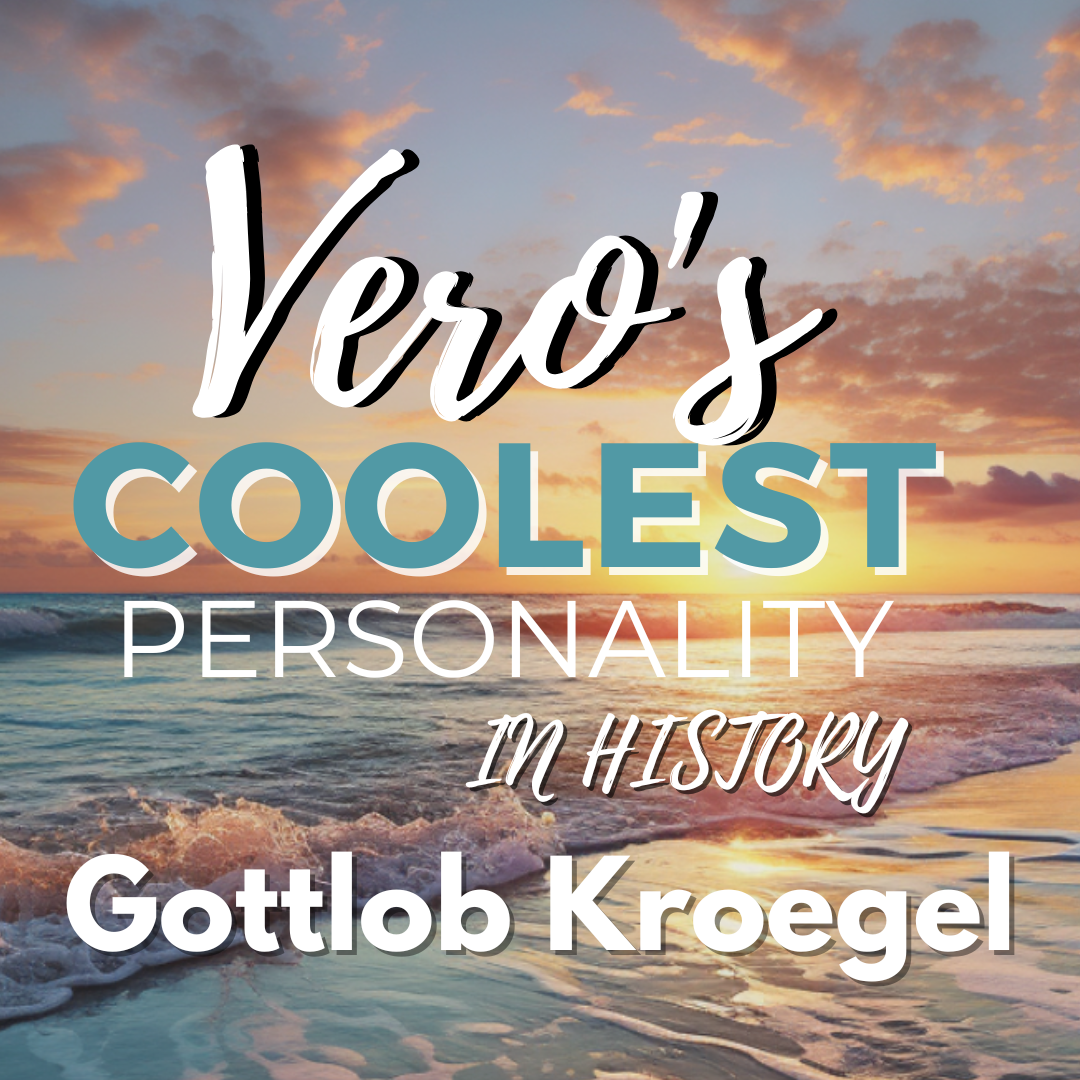When discussing the most influential figures in Vero Beach history, one name stands out among the rest—Gottlob Kroegel. A pioneer, homesteader, and visionary, Kroegel laid the foundation for what would become the thriving community of Sebastian and played an instrumental role in shaping the future of Indian River County. His legacy continues to be felt today, a testament to his resilience, innovation, and passion for the land he called home.
From Germany to Florida: The Journey of a Pioneer
Born in Chemnitz, Germany, in the mid-19th century, Gottlob Kroegel was no stranger to hardship. After the tragic loss of his wife, he set sail for the United States in 1870 with his two young sons, Paul and Arthur. Seeking a fresh start, he first settled in Chicago before moving to New York and, later, Ohio, where Arthur remained with extended family.
Gottlob and his eldest son Paul, however, had their sights set on something greater. In 1879, lured by the promise of the Homestead Act, they made their way to Florida. With no roads to guide them, they sailed south along the eastern coast, arriving at a lush, unspoiled paradise known then as New Haven (now Sebastian). The beauty and abundance of the Indian River Lagoon captivated them, and it was here that they decided to stake their claim.
Upon reaching Barker’s Bluff, an ancient Native American shell mound that offered an elevated vantage point of the surrounding landscape, Kroegel recognized its potential. The land was fertile, the river teeming with fish, and an island just offshore—Pelican Island—was home to a vast population of birds. It was the perfect place to settle.
--> Join the conversation in Vero Beach Foodie and 46,600 very active members right now! <--
--> Subscribe to our weekly email and discover all the local events and happenings around the town. Join 26,650 of your neighbors right now! <--
His first home, a modest palmetto shanty, was soon destroyed by a hurricane, but that didn’t stop him. Kroegel rebuilt, this time crafting a sturdy wood-framed house that would stand for decades. As one of the first European settlers in the area, he paved the way for future homesteaders, helping to transform Sebastian into a thriving community.
Kroegel wasn’t just a settler—he was an innovator. He established the first commercial orange grove in Indian River County, forever shaping the region’s agricultural identity. Recognizing the need for better infrastructure, he also built the area’s first fruit packinghouse, ensuring that locally grown produce could reach wider markets.
The shell mound he built his home upon held thousands of years of history, containing artifacts from ancient civilizations. In 1908, he sold portions of it to be used in the construction of Old Dixie Highway, the region’s first paved road, facilitating trade and transportation.
Perhaps the most significant impact of Gottlob Kroegel’s legacy is not just in what he built, but in who he raised. His son, Paul Kroegel, became a renowned conservationist and the driving force behind the establishment of the first National Wildlife Refuge in the United States—Pelican Island. Paul’s passion for protecting wildlife was undoubtedly shaped by his upbringing on Barker’s Bluff, where he watched pelicans soar over the Indian River. His efforts caught the attention of President Theodore Roosevelt, who, in 1903, designated Pelican Island as a protected refuge—the first of its kind.
Gottlob’s role in settling Sebastian and nurturing a family that would go on to shape the nation’s conservation movement cannot be overstated. Without his determination to create a home in this untamed wilderness, the region’s history—and perhaps even America’s environmental policies—might have taken a very different path.
Gottlob Kroegel lived in Sebastian until his passing in 1923 at the age of 86. He was known as a kind, hard-working man with a love for the land and an appreciation for the natural world. His contributions to the growth of Sebastian—its agriculture, infrastructure, and community—are woven into the fabric of Indian River County’s history.
His descendants, including his great-great-grandson Tim Timinsky, continue to share his story, ensuring that his pioneering spirit is never forgotten. Recently uncovered Kroegel family photographs, once believed lost in a fire, have provided new insights into his life and the early days of Sebastian, offering a rare glimpse into the hardships and triumphs of Florida’s pioneers.
Today, Gottlob Kroegel’s influence can be seen in the preserved lands of Pelican Island, the orange groves that still dot the county, and the thriving community of Sebastian, which owes much of its foundation to his vision. A man who turned untamed wilderness into opportunity, he is a true icon of Vero Beach history—one whose impact will continue to be felt for generations to come.
Sources
- Koestoyo-Barnoske, Robin. Recently Unearthed Kroegel Family Photographs Put on Display. The Newsweekly. TCPalm
- Canupp, Shelley. Centennial: Pioneers Leave Evidence of Thriving River Town in What’s Now Sebastian. Press Journal. TCPalm
- The Kroegel Family Story. Sebastian 100. Sebastian 100
- Top Leak Detection Companies in Vero Beach, FL - May 24, 2025
- Top 9 Can’t-Miss Concerts Hitting Florida in 2025 - May 22, 2025
- Top 9 Used Car Detailers in Indian River County, Florida - May 21, 2025

